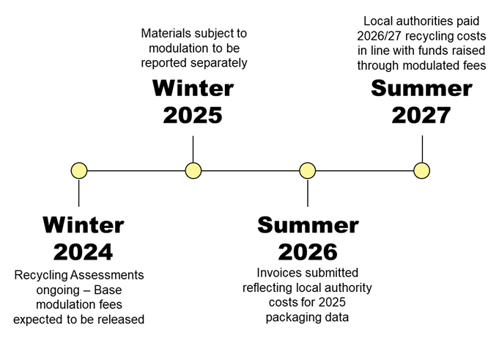Packaging EPR – Incentivising packaging recyclability t...
Eco-modulation is an innovative environmental approach that involves incentivising or penalising businesses based on their choice of packaging materials, with the aim of encouraging environmentally responsible practices. Although unconfirmed at this stage, there is potential for companies to receive rewards (a fee bonus) for opting for packaging that can be recycled or reused, while DEFRA has announced those using materials that are not widely recycled face potential penalties and higher modulation fees (a fee malus).
“Eco-modulation emerged as a way to revive the possibility of eco-design.” – Reid Lifset
Under the existing Packaging Waste Producer Responsibility (The Producer Responsibility Obligations (Packaging Waste) Regulations 2007 (as amended)) obligated producers contribute towards a proportion of the recycling costs, with local authorities picking up the majority of the costs. Under packaging Extended Producer Responsibility (pEPR) DEFRA are planning to shift this full cost to the producer. DEFRA plan to modulate EPR packaging fees to incentivise packaging recyclability i.e., harder to recycle materials will be penalised with higher costs as they will cost local authorities more to process.
Why?
Over the past decade, harder to recycle materials such as multi-layer flexibles or laminates are becoming more common place, as they’re light, flexible and effective forms of packaging. However, these materials are challenging to process at end of life due to complex composite formats, therefore will usually find their way into incineration or landfill.
How?
The criteria of modulated fees is expected to include:
- Differentiating material characteristics (such as density)
- Cost of processing with current waste management infrastructure
- Expected revenue for the material post recycling
- Other format and material factors

*Subject to change. SOURCE DEFRA August 2023 Modulated Fee webinar.
During London Packaging week, 21 and 22 September 2023, DEFRA confirmed the modulation of EPR fees will involve higher fees for the disincentivised packaging formats and materials vs a lower rate for other packaging formats. DEFRA released a list of packaging types that are being considered for higher (malus) modulated fees:
- Some black plastic
- PVC
- Polystyrene
- Multi material plastic films
- Non-PE non-PP foamed plastics
- High wet strength paper & card
- Some coated papers
- Paper and card with “too much” foil embossing
- Some fibre-based composites
- Paper and card with double sided lamination
- Glass with attached ceramics
- Some packaging in the “wood” and “other” category
Engage with DEFRA and have your say on the above packaging formats and their recyclability - here
The Challenge
Eco-modulation aligns with broader efforts to promote environmentally conscious product design, however, what benefits the environment may not necessarily equate to higher recycling rates or greater recycled content. Despite lower recyclability, lightweight packaging contributes to waste reduction by using fewer materials. It also enhances logistics and transportation efficiency, leading to reduced greenhouse gas emissions, and increases product durability and shelf life. This highlights that when assessing the sustainability types of packaging, a whole range of factors should be considered, accounting for the full life cycle.
This challenge of influencing eco-design of packaging extends beyond Extended Producer Responsibility (EPR) and eco-modulation. Recycling and achieving circularity are both methods to reach a larger goal of improving all aspects of the environment.
Need help getting ready for the implementation of EPR Modulated Fees? Or simply want more guided packaging choices? Beyondly’s expert team can help, for more information please contact solutions@beyond.ly.
